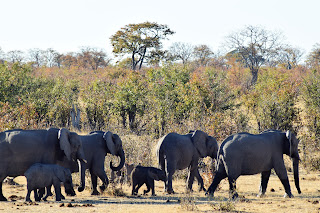As September arrives, very little seemingly has changed since
March. Borders are still closed. Face masks are the norm. COVID cases continue to rise. Zimbabwe still has a lockdown in effect, though
it has eased greatly since the early days.
Restaurants are now open for takeout.
The curfew has been extended to 8PM.
And the national parks reopened in July.
We jumped at the chance to get out of town and visit Hwange National
Park – in the eastern part of Zimbabwe, near the Botswana border. We recruited a few friends and colleagues
from the embassy to come along, rented out a self-catering (pack in / pack out)
private camp, loaded up the cooler and all sorts of provisions, and headed out
for a 5-night getaway.
 |
Why did the zebra cross the road?
|
 |
Elephants ambling through the landscape. So Africa!
|
The trip out to Hwange is an all-day, 12+ hour trek on terrible roads,
so we decided to break up the drive and stay the first night at a regular ol’
hotel in Bulawayo. After spending months
in near isolation, only occasionally venturing into the office and seeing no
more than a few people ever at any one time, the hotel stay was a bit of a
shock to the system. LOTS of people
crowded into the hotel bar, most without masks.
We ordered dinner quickly and headed to our rooms for an early night. We were up and out by 9AM the next day to
make a quick getaway so we could get to camp in time for sundowners (happy
hour).
 |
We glimpsed a few giraffe strolling by our tent one afternoon.
|
 |
A couple elephants get a drink from the water hole outside our camp while a herd of buffalo pass by.
|
The camp was absolutely beautiful.
Five tents (but with full baths and running water – this was glamping
for sure) set around a large common-area tent with a kitchen, sitting area,
dining area, and huge deck overlooking a small water hole where elephants,
water buffalo, and antelope made daily visits.
In the mornings, we would drive a few kilometers to a larger water hole
that was visited by just about every safari critter you can imagine. Look to the left – a herd of elephants,
straight ahead – an obstinacy of buffalo (my favorite collective noun ever),
over to the right – some kudu, impala, water buck, and other antelope. Oh, and just over there – a pride of about 15
lions with the huge male presiding over a recent kill. (A water buffalo, and we didn’t see if
happen. Just got to watch as they
enjoyed their feast.)
 |
The common area tent and viewing deck at our camp.
|
 |
Hard to really call it a "camp" when this is a "tent."
|
 |
The wildlife diversity at the water hole a few kilometers from our camp was astounding. Here we have some hippos - with some oxpeckers (birds) hitching a ride on their backs.
|
 |
And elephants. Hundreds of elephants.
|
 |
And water buffalo. Hundreds of them too.
|
 |
And a pride of lions enjoying their feast. (Resulting in one less water buffalo.)
|
 |
And all manner of antelope. Here we have kudu (the bigger ones in the foreground) and impala (the smaller ones behind).
|
Back to the camp for the afternoon, and then off to another water hole
or some other viewing spot to watch the progression of animals for their afternoon drink
of water – and our afternoon gin and tonics.
 |
Showing us their best side.
|
 |
All sizes well represented.
|
 |
This photo has a little bit of everything going on. Buffalo, elephants, a hippo, and even crocs.
|
We saw one other family a couple of times during our stay. Otherwise it seemed we had the entire park to
ourselves. The animals seemed particularly happy too. I'm sure we were
the first people they’d seen in at least a couple months since the lockdown
began and the parks closed. I’m sure
they appreciated the break from ogling humans.
 |
Mom showing the little guy how it's done.
|
 |
The winner of the "Smallest Elephant" contest.
|
There are times when this job seems particularly frustrating and
difficult. Human rights abuses. Corruption.
Food insecurity. And, of course,
COVID. It seems my work is an endless
stream of reporting on these issues with very little progress to show for
it. But being out in the southern
African savanna, watching the wildlife go about their routine, taking in the
breathtaking vastness, listening to the birdsongs and the elephants’ trumpets
and the dear-god-what-was-THAT??? To see
it, to be a part of it, to live it (if only for a couple years). I realize how fortunate I am to experience
this, and so I will go on monitoring the day-to-day struggles. But I will look forward to our next
opportunity to get out, recharge, and see more of this beautiful country.































